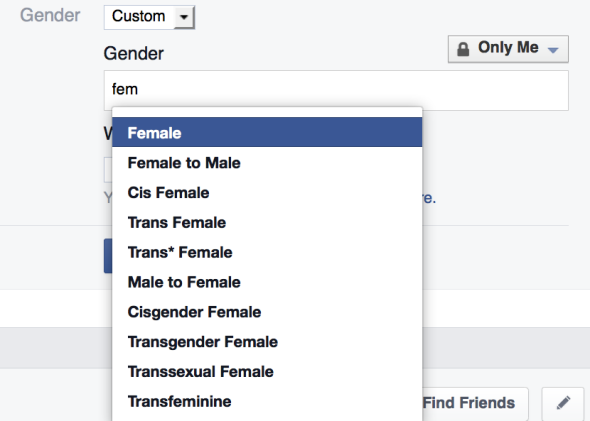On Thursday, Facebook announced a new policy designed to resolve the perpetually vexed issue of online gender identification: Starting soon, users will be permitted to write in their own gender identity, unconstrained by a prepopulated list. This change arrives about a year after Facebook added more than 50 custom gender options for users to choose from. Under the new policy, users can maintain the identity they chose from that list—but they’ll also be permitted to get creative.
Facebook’s quest to permanently solve the gender problem is admirable. It is also doomed. By creating a slew of choices and adding a fill-in-the-blank option, the company wants users to know that it’s OK with gender nonconformity and sensitive to the struggles of those who don’t fit into the gender binary. But it has done nothing to fix the problem that launched all these attempted solutions. That problem, of course, is that Facebook still demands to know your gender. And until the company lets go of the desire to sort users this way, they’ll continue to be tortured by the gender question.
At bottom, the snag in Facebook’s evolving gender policies is quite simple: Gender is an utterly arbitrary and artificial classification. There is virtually never a legitimate reason for anybody—an employer, a government, a website—to classify people based on gender, or to force them to do so themselves. (The sole exception here is employment discrimination, when women and trans workers may need to demonstrate that they faced discrimination on account of their gender.) Society’s perceived distinctions between the genders is fundamentally irrational and sexist; continuing to divvy up humans based on gender only perpetuates a power hierarchy that will always place men on top.
That is not to say that gender identification cannot be empowering for some—especially for gender minorities, who may use Facebook as a vehicle through which to come out. But this identification must be entirely voluntary, as should be one’s decision to publicly identify as a man or a women. The fact that I identify is male is, to my mind, as meaningless as the fact that I have green eyes. It signals—or should signal—absolutely nothing to anybody, except perhaps a romantic partner. Yet while Facebook has no interest in my eye color, it demands to know my gender. Why?
A representative for Facebook explained to me that the website still mandates some gender identification so it can formulate the correct pronouns. For instance, on my birthday, my Facebook friends all see a notification that reads something like “It’s Mark’s birthday. Wish him a happy birthday!” Were I female, the him would be her; were I some other gender, it would be them.
A Facebook representative informed me that, in order to get this pronoun right, the website needs to know your gender. But that’s not really correct, for two reasons. First, under the new policy, users can actually choose their preferred gender pronoun, as distinct from their gender. (This gender pronoun update is actually the most brilliant part of the new policy.) Second, I cannot imagine that Facebook’s prompts are so numerous and complex that they could not be slightly reworked to exclude gender-specific pronouns altogether. (For instance: “Wish Mark a happy birthday!”)
In fairness, Facebook does allow users to hide their gender identity from their timeline altogether, resolving any potential concerns about trans kids inadvertently coming out to transphobic family members. But if Facebook is willing to take that step, why not be done with the whole ball of wax and make gender identity totally optional? In almost every context, gender classifications are irrational and pointless. Facebook wants to show sensitivity by giving users an endless array of gender options. But there’s a much better, neater solution here: Just forget about gender altogether.
